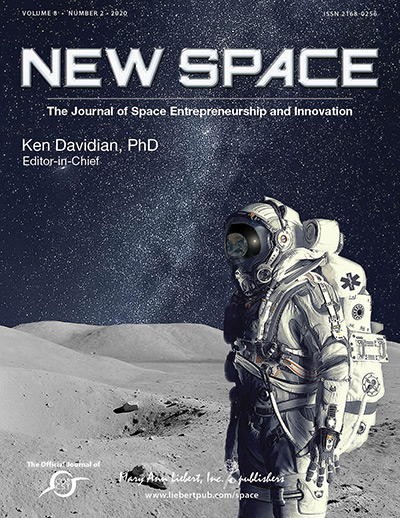Three members of the Sovaris Aerospace team (Dr. Michael A. Schmidt, Caleb M. Schmidt, M.S., and Dr. Bob Hubbard) have partnered with Dr. Chris Mason and his team at Weill Cornell Medicine to publish a new paper entitled, Why Precision Medicine is the Frontier of Medicine and Performance for Humans in Space. The paper was published in the journal New Space and is part of a special issue dedicated to the work of members of the FAA Center of Excellence for Commercial Space Transportation, of which Sovaris Aerospace is a part.
New Space is the only international peer-reviewed journal dedicated to academic, industry, and government contributions to space entrepreneurship and innovation. It is the forum in which innovative applications of new space-based technologies and initiatives will be discovered, identified, discussed, and applied. Congress authorized the Centers of Excellence for Commercial Space Transportation was established by Congress to enable the FAA to work with universities and their industry partners to conduct cutting edge research into technologies and infrastructure for private human spaceflight and orbital debris mitigation.
Why Precision Medicine is the Frontier of Medicine and Performance for Humans in Space
ABSTRACT:
To date, more than 565 professional astronauts have flown in space, of whom only 11% have been women. Of these, 357 have been NASA astronauts, of whom 86% have been men and 14% have been women. This cohort of professional astronauts has been uniquely fit and exceptionally well trained. The advent of commercial spaceflight will see a wider range of individuals enter space, who lie on a variegated continuum of physical fitness, metabolic fitness, disease complexity, drug therapeutics, and genetics. Yet, there are currently little data on individuals of lesser fitness entering space.
In addition, the initial planetary missions to Mars will embark without any data associated with such a mission (e.g., 3 years). Even as we begin to gather such data from the initial Mars missions, the cohorts will be small with uncertain generalizability. While spaceflight medicine has grown in sophistication, we are still faced with clear knowledge gaps. This occurs just as the community of space travelers is about to expand and the complexity of planetary missions is at its most ambitious.
Fortunately, the advent of comprehensive molecular profiling, including some in mission, allows us to address some of these unknowns by applying complex molecular analytics to individuals and developing personalized countermeasures derived from those analytics.
CITATION:
Schmidt, MA, Schmidt, CM, Hubbard, RM, Mason, CE (2020) Why Personalized Medicine is the Frontier of Medicine and Performance for Humans in Space. New Space 2020 Vol. 8, No. 2. Special Section: Center of Excellence CST Research
ACKNOWLEDGEMENTS:
We extend a special thanks to the Federal Aviation Administration Center of Excellence for Commercial Space Transportation. We also thank the University of Colorado Aerospace Engineering Sciences, College of Engineering & Applied Science. We offer our sincere thanks to Dr. David Klaus, Associate Chair, Undergraduate Program, Aerospace Engineering Sciences, University of Colorado. Finally, we thank Julian C. Schmidt, MS of Sovaris Aerospace, for citation support.
LINK:
https://www.liebertpub.com/doi/10.1089/space.2019.0037
COVER DESIGN:
Sovaris Aerospace


Leave A Comment